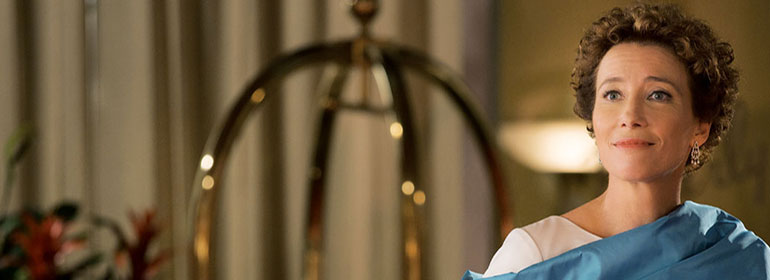Saving Mr Banks, a review.
Watching Saving Mr Banks, it’s difficult not to imagine PL Travers literally spiraling in her grave. The film, brought to us by the Disney company, tells the story of the culmination of Walt Disney’s 20-year battle to secure the film rights to Mary Poppins, when in 1964 Pamela Travers finally travelled from London to LA, to oversee the development of the film, before agreeing to sign on the dotted line.
Travers was a notoriously controlling character, as was Disney, albeit in a very different way. While the latter, as played here by Tom Hanks, used charisma to get his way, Travers (Emma Thompson) was implacable and ruthless. Much of the film plays this conflict of character for comedy as Walt tries to charm the socks of an unbending Pamela, and with it, Saving Mr. Banks goes a long way in charming its audience’s socks off.
In between we get two other stories: a flashback to Travers’ childhood and the tragic genesis of Mary Poppins in her imagination, and in ‘current time’ the development of the film of her book, helmed by visual scriptwriter, Don DaGradi and the Sherman Brothers, who wrote the songs, over the course of a fortnight at Disney’s Burbank studios.
As Travers battles against every tiny little decision DaGradi and the Shermans make, she increasingly ruminates on her childhood relationship with her alcoholic father (Colin Farrell). Even though the flashback segments of the film are supposed to poignantly underpin Travers adult eccentricities and isolation, they’re the weakest, possibly because of Farrell’s performance, which is so increasingly over the top, a sense of realism is sacrificed. Plus these are the parts of the film when Emma Thompson, who literally shines forth with complicated brilliance from every scene she swallows up, is not on screen.
Tom Hanks plays Disney as an inscrutable character, a man who insists on all his employees using his first name, but who is barely accessible on an emotional level. Even in the big moment, in which Walt ultimately convinces Pam to sign over her book’s rights by describing his own brutal childhood, you get the sense of a showman pulling heartstrings to his own ends.
The idea that Travers would have been convinced by such sentimentality is what might have her spinning in her grave. Yes, she did weep throughout the screening of Mary Poppins at a lavish Hollywood premiere to which she wasn’t actually invited, but it wasn’t because the film’s father-child relationships resolved her own childhood suffering. Instead she felt Disney had bowlderised the book she so identified with. She refused to give him rights to any of her other Poppins novels, and the truth is she signed over the first two, from which the Oscar winning film was adapted, because of financial difficulties.
Truth aside, Saving Mr Banks is a rare thing, a Disney film that’s a very adult entertainment. Whether it will melt your heart will depend on how you like your adult entertainment, dolloped with a spoonful of sugar or ten in the closing reels or not. But in the meantime it’s a witty, dark and acerbic, and even though the Disneyfication of Travers triumphs, it’s not afraid to cast a cold eye over the mass consumerism at the heart of Disney’s particularly American dream. Indeed, old Walt might be spinning in his grave too, just a little bit.
SAVING MR BANKS is released on November 29
© 2013 GCN (Gay Community News). All rights reserved.
